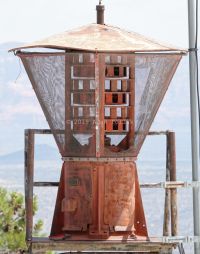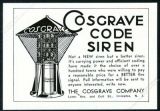Gamewell Codewell: Difference between revisions
(Add image from CDS) |
ArxCyberwolf (talk | contribs) (Added image) |
||
| Line 2: | Line 2: | ||
---- | ---- | ||
Cosgrave Code Siren|company=Gamewell Corporation | Cosgrave Code Siren|company=Gamewell Corporation | ||
Austin Cosgrave|produced=1920s-1930s?|type=[[Omnidirectional]] [[Electromechanical]]|hz=60|hp=5 hp|voltage=220|current=AC 3 ph|image=Cosgrave_2.jpg}}The '''Gamewell Codewell''', previously and commonly known as the '''Cosgrave Code Siren''', is a siren that was originally designed by Austin Cosgrave who later gave the job to make the siren to Gamewell. | Austin Cosgrave|produced=1920s-1930s?|type=[[Omnidirectional]] [[Electromechanical]]|hz=60|hp=5 hp|voltage=220|current=AC 3 ph|image=Cosgrave_2.jpg|caption=An inactive Codewell, located in Jerome, AZ. It is one of two remaining units in existence. Image credit to Adam Pollak.}}The '''Gamewell Codewell''', previously and commonly known as the '''Cosgrave Code Siren''', is a siren that was originally designed by Austin Cosgrave who later gave the job to make the siren to Gamewell. Exact dates of production are currently unknown, but an advertisement exists for this siren dated to 1929, so it was produced around that time. | ||
== History and Design == | == History and Design == | ||
[[File:1931-Cosgrave-Code-warning-siren.jpg|left|thumb|160x160px|A 1931 advert for the Cosgrave Code Siren.]] | |||
The Cosgrave Code Siren, later known as the Codewell, was produced by the Gamewell Corporation, after being purchased from Austin B. Cosgrave of Mountain Lakes, NJ, who originally designed the siren in the mid-late 1920s. With the fire siren market booming in the 1920s, with many manufacturers creating their own electric sirens including [[Federal Electric Type Mach. B|Federal]] [[Federal Electric Fedelcode|Electric]], [[Sterling Siren Fire Alarm Co.|Sterling Siren]], [[Erick Fire Siren|Erick Electric Sirens]], and others. The Cosgrave siren was designed with built-in coding capabilities as standard, which gave it an edge over other manufacturers that modified existing designs to incorporate coding, which was more expensive. | The Cosgrave Code Siren, later known as the Codewell, was produced by the Gamewell Corporation, after being purchased from Austin B. Cosgrave of Mountain Lakes, NJ, who originally designed the siren in the mid-late 1920s. With the fire siren market booming in the 1920s, with many manufacturers creating their own electric sirens including [[Federal Electric Type Mach. B|Federal]] [[Federal Electric Fedelcode|Electric]], [[Sterling Siren Fire Alarm Co.|Sterling Siren]], [[Erick Fire Siren|Erick Electric Sirens]], and others. The Cosgrave siren was designed with built-in coding capabilities as standard, which gave it an edge over other manufacturers that modified existing designs to incorporate coding, which was more expensive. | ||
This siren is unique, as it winds up like a normal siren but goes silent almost immediately after shutting off, allowing it to create coded signals. This is achieved by using a special gearbox above the motor to lift the three rotors in line with the stators when the motor is powered, allowing it to create sound by chopping the air. When the motor shuts off, the rotors lower and are no longer in line with the stators, instantly silencing the siren. This mechanism is placed above the motor, in between the motor and rotors. By repeatedly turning the siren on and off, this creates a coded signal as the rotors lift and lower from alignment with the stators. | This siren is unique, as it winds up like a normal siren but goes silent almost immediately after shutting off, allowing it to create coded signals. This is achieved by using a special gearbox above the motor to lift the three rotors in line with the stators when the motor is powered, allowing it to create sound by chopping the air. When the motor shuts off, the rotors lower and are no longer in line with the stators, instantly silencing the siren. This mechanism is placed above the motor, in between the motor and rotors. By repeatedly turning the siren on and off, this creates a coded signal as the rotors lift and lower from alignment with the stators. | ||
This siren has 3 choppers attached to a single rotor shaft and motor with 3 stators held up by a tall vertical frame, with all 3 rotors and stators being 12-port single tone. The motor is made by Robbins & Myers, and is a 5 hp, 220 V 3 ph motor that runs at 3500 RPM. The siren itself is inside of a tall triangular shroud, which is largely made of mesh, with a steel rainshield on top. The motor is protected by a cover, which also serves as the mount. The shroud resembles a tall | This siren has 3 choppers attached to a single rotor shaft and motor with 3 stators held up by a tall vertical frame, with all 3 rotors and stators being 12-port single tone. The motor is made by Robbins & Myers, and is a 5 hp, 220 V 3 ph motor that runs at 3500 RPM. The siren itself is inside of a tall triangular shroud, which is largely made of mesh, with a steel rainshield on top. The motor is protected by a cover, which also serves as the mount. The shroud resembles a tall Erick siren. A service door is included on the cover, which allows easy access to the motor. Decorative fins also adorn the motor cover. | ||
The very first unit was installed in Oconomowoc, WI, and was eventually removed after years of service. At least 104 units were built, and only two Cosgrave sirens are known to still exist, both in currently non-functional condition. One is in private possession with restoration planned, and the other is located in Jerome, AZ, nearby to a working [[William A. Box Iron Works Co.|Denver Quadruplex]] siren on top of the Jerome Ghost Pepper Co. While this unit is presumably operable, the controls were destroyed by lightning. A third unit is believed to exist in the Dominican Republic, though this is unconfirmed. | The very first unit was installed in Oconomowoc, WI, and was eventually removed after years of service. At least 104 units were built, and only two Cosgrave sirens are known to still exist, both in currently non-functional condition. One is in private possession with restoration apparently planned, and the other is located in Jerome, AZ, nearby to a working [[William A. Box Iron Works Co.|Denver Quadruplex]] siren on top of the Jerome Ghost Pepper Co. While this unit is presumably operable, the controls were destroyed by lightning. A third unit is believed to possibly exist in the Dominican Republic, though this is unconfirmed. | ||
[[Category:Sirens]] | [[Category:Sirens]] | ||
[[Category:Electromechanical Sirens]] | [[Category:Electromechanical Sirens]] | ||
Latest revision as of 23:49, 22 October 2024
| Gamewell Codewell
Cosgrave Code Siren | |
 An inactive Codewell, located in Jerome, AZ. It is one of two remaining units in existence. Image credit to Adam Pollak. | |
| Company | Gamewell Corporation
Austin Cosgrave |
|---|---|
| Produced | 1920s-1930s? |
| Type | Omnidirectional Electromechanical |
| Frequency | 60 Hz |
| Horsepower | 5 hp |
| Voltage | 220 V AC 3 ph |
The Gamewell Codewell, previously and commonly known as the Cosgrave Code Siren, is a siren that was originally designed by Austin Cosgrave who later gave the job to make the siren to Gamewell. Exact dates of production are currently unknown, but an advertisement exists for this siren dated to 1929, so it was produced around that time.
History and Design

The Cosgrave Code Siren, later known as the Codewell, was produced by the Gamewell Corporation, after being purchased from Austin B. Cosgrave of Mountain Lakes, NJ, who originally designed the siren in the mid-late 1920s. With the fire siren market booming in the 1920s, with many manufacturers creating their own electric sirens including Federal Electric, Sterling Siren, Erick Electric Sirens, and others. The Cosgrave siren was designed with built-in coding capabilities as standard, which gave it an edge over other manufacturers that modified existing designs to incorporate coding, which was more expensive.
This siren is unique, as it winds up like a normal siren but goes silent almost immediately after shutting off, allowing it to create coded signals. This is achieved by using a special gearbox above the motor to lift the three rotors in line with the stators when the motor is powered, allowing it to create sound by chopping the air. When the motor shuts off, the rotors lower and are no longer in line with the stators, instantly silencing the siren. This mechanism is placed above the motor, in between the motor and rotors. By repeatedly turning the siren on and off, this creates a coded signal as the rotors lift and lower from alignment with the stators.
This siren has 3 choppers attached to a single rotor shaft and motor with 3 stators held up by a tall vertical frame, with all 3 rotors and stators being 12-port single tone. The motor is made by Robbins & Myers, and is a 5 hp, 220 V 3 ph motor that runs at 3500 RPM. The siren itself is inside of a tall triangular shroud, which is largely made of mesh, with a steel rainshield on top. The motor is protected by a cover, which also serves as the mount. The shroud resembles a tall Erick siren. A service door is included on the cover, which allows easy access to the motor. Decorative fins also adorn the motor cover.
The very first unit was installed in Oconomowoc, WI, and was eventually removed after years of service. At least 104 units were built, and only two Cosgrave sirens are known to still exist, both in currently non-functional condition. One is in private possession with restoration apparently planned, and the other is located in Jerome, AZ, nearby to a working Denver Quadruplex siren on top of the Jerome Ghost Pepper Co. While this unit is presumably operable, the controls were destroyed by lightning. A third unit is believed to possibly exist in the Dominican Republic, though this is unconfirmed.